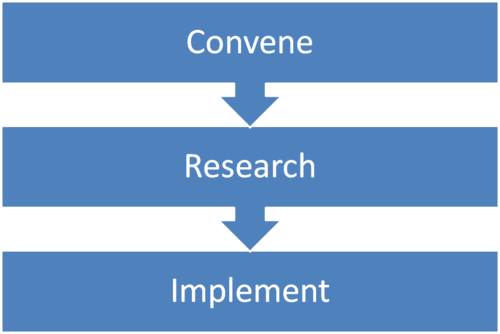The Technology and Trafficking in Persons Research Project has developed a three part proposal to evaluate the communication deficits in the anti-trafficking effort.

It is in this space that the USC Annenberg Center on Communication Leadership & Policy (CCLP) can serve in a leadership role, bringing on-the-ground experience and expertise in academia, technology and foreign affairs. Following our fact finding mission to Thailand and Cambodia and site visit and analysis of use of SMS technology in Haiti, CCLP proposes a pilot program in the Mekong Sub Region.
Convene
2010 TIP Technology Symposium
State Department and Congressional policymakers, along with nongovernmental organization and technology industry leaders convened in Washington, D.C. Thursday, June 3, 2010 to explore new ways communication technology might be used in global efforts to combat human trafficking.
The meeting held at the USC Washington, D.C. Center was organized by USC Annenberg’s Center on Communication Leadership & Policy (CCLP) in partnership with the U.S. Department of State. Geoffrey Cowan, CCLP director and USC University Professor, co-chaired the gathering with Alec Ross, Secretary of State Clinton’s senior adviser for innovation.
Participants Government included Ambassador Luis CdeBaca, head of the Department of State’s Office to Monitor and Combat Trafficking in Persons, bi-partisan representatives from the Senate Foreign Relations Committee, and USAID. Other leaders came from Silicon Valley, Non-Governmental Organizations (NGOs), the MIT SENSEable City Lab, and academia. Participants identified several key communication problems and possible technological solutions.
Research
Mekong Sub-Region Fact Finding Mission
 From August 6-15, 2010, CCLP Research Director Mark Latonero and Research Associate Erin Kamler visited Thailand and Cambodia to conduct initial research for CCLP’s Technology and Trafficking In Persons (TIP) initiative.
From August 6-15, 2010, CCLP Research Director Mark Latonero and Research Associate Erin Kamler visited Thailand and Cambodia to conduct initial research for CCLP’s Technology and Trafficking In Persons (TIP) initiative.
The goal of the trip was to conduct preliminary research for the development and design of a TIP Information Sharing Platform (ISP)–a broadly conceived mobile and web-enabled system to help NGOs, social service providers, law enforcement and victims connect and share information. The CCLP research team also sought to continue building potential partnerships with key players active in combating TIP in the Mekong Sub-Region.
 Based on recommendations from the June 3 meeting in Washington, D.C. and further research, CCLP focused on the Mekong Sub Region (Cambodia, Laos, Thailand, Vietnam, Yunnan China and Burma), an area of critical needs in combating Trafficking and one in which possible technological solutions are just beginning to emerge. The team centered the initial research trip on Thailand and Cambodia, listed as Tier 2 Watch List and Tier 2, respectively, in the Department of State’s 2010 TIP report. Both countries are source, transit and destination countries for men, women and children forced into labor and prostitution.
Based on recommendations from the June 3 meeting in Washington, D.C. and further research, CCLP focused on the Mekong Sub Region (Cambodia, Laos, Thailand, Vietnam, Yunnan China and Burma), an area of critical needs in combating Trafficking and one in which possible technological solutions are just beginning to emerge. The team centered the initial research trip on Thailand and Cambodia, listed as Tier 2 Watch List and Tier 2, respectively, in the Department of State’s 2010 TIP report. Both countries are source, transit and destination countries for men, women and children forced into labor and prostitution.
Case Study: SMS Technology in Haiti
Mark Latonero, CCLP research director, recently returned from a trip to Haiti, where he studied how relief organizations and community groups are using mobile phones and SMS technology to coordinate among community, address gender based violence, aid communication from international relief organiization, as well as communicate information bulletins.
Implement
Information Sharing Platform for Mekong Sub Region
CCLP proposes two technological solutions that could have a significant & immediate impact:
- A regional cross-border text and voicemail enabled hotline
- A standardized victim identification and case management system for information sharing.
 The hotline will integrate mobile technologies, taking advantage of the widespread use of cell phones in the region. The user-friendly platform will be able to receive texts (SMS) and voicemails in multiple languages and forward messages to appropriate organizations that can act on incoming information in real time. The system will allow for mapping of locations as an additional aid to those combating TIP in the region.
The hotline will integrate mobile technologies, taking advantage of the widespread use of cell phones in the region. The user-friendly platform will be able to receive texts (SMS) and voicemails in multiple languages and forward messages to appropriate organizations that can act on incoming information in real time. The system will allow for mapping of locations as an additional aid to those combating TIP in the region.
 This platform will also serve as a case management system for organizations to monitor and track victims as they are identified and move through the process of social reintegration. Organizations using the common system could share information to alert partnering service providers about victims’ immediate and future needs.
This platform will also serve as a case management system for organizations to monitor and track victims as they are identified and move through the process of social reintegration. Organizations using the common system could share information to alert partnering service providers about victims’ immediate and future needs.
CCLP’s partners, consultants and advisors on the project bring extensive experience developing technology-based systems to address global social issues. The team is developing a three-year pilot project, implemented in partnership with a small group of anti-trafficking organizations in Thailand and Cambodia, and supported by technology experts and social scientists coordinated by CCLP in the United States. Throughout the pilot, the system will be refined and revised to maximize the benefit to victims and usability by anti-trafficking organizations in the field. A successful pilot would be scalable to other countries and regions where human trafficking is prevalent.